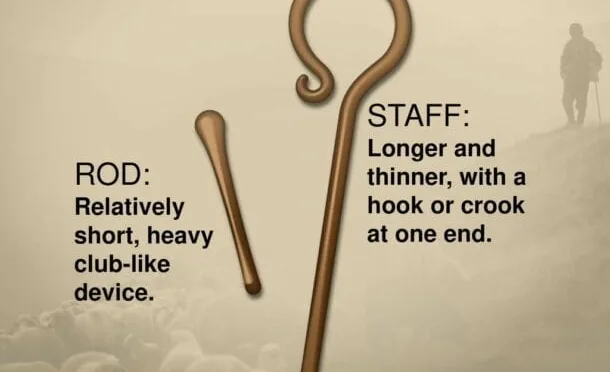In Psalm 23:4 (AMP), David declares, “Your rod [to protect] and Your staff [to guide], they comfort me.” These two instruments—the rod and the staff—carry deep spiritual symbolism that reveals the fullness of God’s care for His people. Both tools, common to shepherds in ancient Israel, display God’s dual nature as both a Protector and Guide, bringing comfort in His care.
The Rod – Symbol of Protection and Authority
The rod was a short, heavy club, crafted to defend the flock against predators. In a spiritual sense, the rod symbolizes God’s power and authority. It represents His fierce protection over His people. Just as a shepherd would strike down a lion or bear threatening his sheep, so God wields His authority to shield us from the enemy’s attacks, giving us comfort in His care.
The rod also served as a tool of discipline. When a sheep wandered too close to danger, the shepherd would use the rod to correct its path. This correction wasn’t born from anger but from love. God disciplines those He loves (Hebrews 12:6). His rod ensures we don’t drift from safety into destruction. When we feel the conviction of the Holy Spirit, it is the loving tap of God’s rod, calling us back to the path of life and providing us comfort in His care.
But the rod is also a symbol of examination. In ancient times, shepherds would use the rod to part the wool of their sheep, inspecting for wounds or parasites. This act of careful inspection ensured the health of the flock. In the same way, God searches our hearts (Psalm 139:23-24), removing anything that could harm our spiritual health. His rod comforts us because it assures us that He sees, He knows, and He cares.
The Staff – Symbol of Guidance and Support
The staff, distinguished by its long slender shape and curved hook, was used to guide and rescue sheep. The shepherd would gently place the staff against the sheep’s side, directing it along the right path. If a sheep fell into a crevice or became tangled in thorns, the shepherd would use the staff’s hook to lift it out and bring it back to safety, showing comfort in His care.
This image beautifully reflects the gentle guidance of God’s Spirit. He does not drive His sheep but leads them. He does not force but invites. He does not abandon but rescues. When we stray, He reaches for us. When we are stuck, He lifts us out. His staff reminds us that He is always near, lovingly leading us along paths of righteousness and providing comfort in His care.
The staff also symbolizes comfort. A sheep that felt the gentle nudge of the staff knew the shepherd was close. In our darkest valleys, the presence of God’s guiding hand becomes our deepest comfort. His nearness dispels fear. The staff assures us that we are not alone, even when shadows surround us, offering us comfort in His care.
The Comfort of the Rod and Staff
David says, “they comfort me.” Why? Because the rod and staff together encompass the fullness of God’s shepherding care. The rod assures us of God’s power to protect—from external enemies and from the sin within us. The staff assures us of God’s faithfulness to guide—gently leading us back when we falter, lifting us when we fall.
Together, they represent God’s steadfast commitment to His people. He will not let harm overtake us, nor will He let us wander without pursuit. His rod confronts our enemies, while His staff comforts our hearts, ensuring we find comfort in His care.
Living Under the Shepherd’s Care
To be comforted by God’s rod and staff is to live under His loving authority and guidance. It is to trust His correction, knowing it leads to life. It is to embrace His guidance, even when the path is uncertain. It is to rest in the assurance that the Good Shepherd lays down His life for His sheep (John 10:11).
And when we walk through the valleys—those shadowed, fearsome places where death seems near—we can walk without dread, for our Shepherd is near. His rod and staff go before us, behind us, and beside us. They remind us that we are seen, known, and defended, finding comfort in His care.
Father, thank You for being our Shepherd, for holding the rod to protect and the staff to guide. Teach us to trust Your correction and follow Your leading. When we stray, draw us back. When we falter, lift us up. Let Your nearness be our comfort, especially in dark valleys. Help us walk in confidence, knowing that You are always with us, protecting and guiding us, bringing us comfort in Your care. In Yeshua’s name, Amen.


